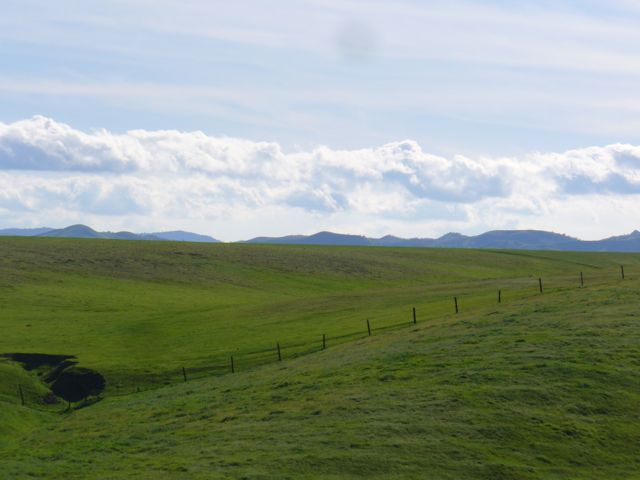Fence where cattle graze (Photo © Anne Novak, all rights reserved)
Cross-posted from The Independent
Nelson offers up fair grazing legislation
Posted: Saturday, July 14, 2012 11:45 pm | Updated: 10:26 pm, Sat Jul 14, 2012.
Sen. Ben Nelson, D-Neb., has introduced a taxpayer fairness bill to end the substantial federal subsidies that an elite number of livestock producers receive.
If enacted, the bill would save American taxpayers about $1.2 billion. Nelson’s bill requires that the Secretary of the Interior work in conjunction with the Secretary of Agriculture to set livestock grazing fees on Bureau of Land Management (BLM) and National Forest System public rangelands at rates comparable to those found on nearby private grazing lands.
“The facts are clear. Two percent of ranchers are getting a benefit that 98 percent of other grazing ranchers have not been able to get. They pay far less than the market value for the right to graze on public lands,” Nelson said . “This isn’t fair to the taxpayer, and this isn’t fair to the other 98 percent of cattle grazers who have to compete in the market-place.
“The State of Nebraska charges over $20 dollars a head of calf to graze on state land. Why should the federal government charge $1.35?”
The senator has also offered his grazing fee bill as an amendment to the Small Business Tax Credit Bill currently before the Senate. If adopted, the amendment would help defray the legislation’s costs.
The Government Accountability Office has estimated that just 2 percent of American ranchers hold animal grazing rights to National Forest System public rangelands. The grazing fees charged by the federal government on the rangelands are far below market value, at times up to 95 percent lower than the market fees charged for grazing on state- and privately-owned lands, fees that 98 percent of grazing ranchers have no choice but to pay.
According to the U.S. Department of Agriculture Statistics Service, Nebraska charged a state land grazing fee of $27.30/animal in 2011. The $1.35 figure cited by Nelson was published in a United States Government Accountability Office (GAO) report on Livestock Grazing-Related Federal Expenditures. Among the GAO report’s findings are:
– From 1980 to 2004, BLM and Forest Service grazing fees fell by 40 percent.
– From 1980 to 2004, the market price on grazing fees rose by almost 80 percent.
– The government collects nearly $21 million/year in grazing fees on public rangelands.
– The government puts about $144 million/year into the maintenance of public rangelands.
“In other words, there is a shortfall of $120 million dollars coming from two percent of ranchers,” Nelson said.
Link to article: http://www.theindependent.com/news/ag_news/nelson-offers-up-fair-grazing-legislation/article_9bf429c2-ce2c-11e1-8158-0019bb2963f4.html
Nelson offers up fair grazing legislation
Posted: Saturday, July 14, 2012 11:45 pm | Updated: 10:26 pm, Sat Jul 14, 2012.
Sen. Ben Nelson, D-Neb., has introduced a taxpayer fairness bill to end the substantial federal subsidies that an elite number of livestock producers receive.
If enacted, the bill would save American taxpayers about $1.2 billion. Nelson’s bill requires that the Secretary of the Interior work in conjunction with the Secretary of Agriculture to set livestock grazing fees on Bureau of Land Management (BLM) and National Forest System public rangelands at rates comparable to those found on nearby private grazing lands.
“The facts are clear. Two percent of ranchers are getting a benefit that 98 percent of other grazing ranchers have not been able to get. They pay far less than the market value for the right to graze on public lands,” Nelson said . “This isn’t fair to the taxpayer, and this isn’t fair to the other 98 percent of cattle grazers who have to compete in the market-place.
“The State of Nebraska charges over $20 dollars a head of calf to graze on state land. Why should the federal government charge $1.35?”
The senator has also offered his grazing fee bill as an amendment to the Small Business Tax Credit Bill currently before the Senate. If adopted, the amendment would help defray the legislation’s costs.
The Government Accountability Office has estimated that just 2 percent of American ranchers hold animal grazing rights to National Forest System public rangelands. The grazing fees charged by the federal government on the rangelands are far below market value, at times up to 95 percent lower than the market fees charged for grazing on state- and privately-owned lands, fees that 98 percent of grazing ranchers have no choice but to pay.
According to the U.S. Department of Agriculture Statistics Service, Nebraska charged a state land grazing fee of $27.30/animal in 2011. The $1.35 figure cited by Nelson was published in a United States Government Accountability Office (GAO) report on Livestock Grazing-Related Federal Expenditures. Among the GAO report’s findings are:
– From 1980 to 2004, BLM and Forest Service grazing fees fell by 40 percent.
– From 1980 to 2004, the market price on grazing fees rose by almost 80 percent.
– The government collects nearly $21 million/year in grazing fees on public rangelands.
– The government puts about $144 million/year into the maintenance of public rangelands.
“In other words, there is a shortfall of $120 million dollars coming from two percent of ranchers,” Nelson said.










No comments:
Post a Comment